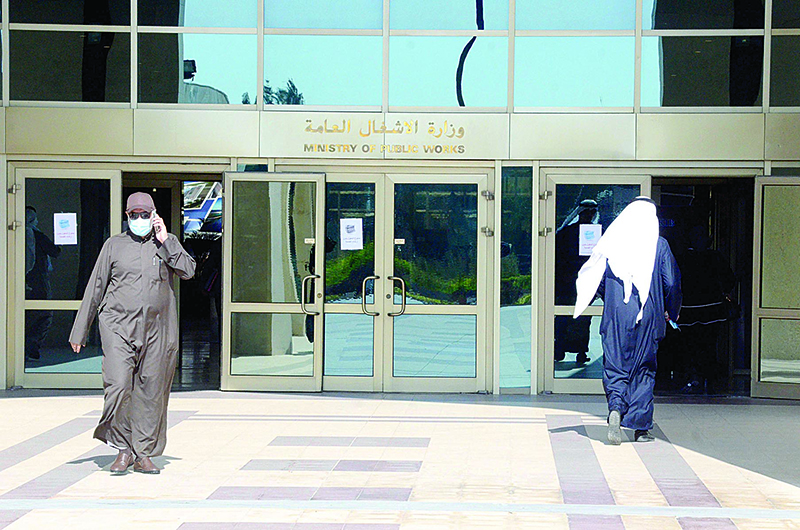 KUWAIT: A person (right) walks into a ministry building yesterday as signs reading ‘no entry without facemask’ are placed on the main door. —Photo by Fouad Al-Shaikh
KUWAIT: A person (right) walks into a ministry building yesterday as signs reading ‘no entry without facemask’ are placed on the main door. —Photo by Fouad Al-Shaikh
By Nawara Fattahova
KUWAIT: Business owners may be forced to pay a fine of up to KD 5,000 if their staff or customers don’t wear facemasks. This decision was issued during the beginning of the pandemic in 2020 but stopped being applied when the country entered the fifth phase of normalization. But for the past two weeks, the rule is strictly enforced by municipal inspectors.
Customers and mall visitors will be penalized if they take off their facemasks. “The salespeople should ask customers to wear their facemasks. If they refuse, the salesperson should not service them and ask them to leave. They can also ask the security guards or police officers for help, who will escort the violating customer to a room at the mall. They will then be taken to the police station where a case will be registered against them to be transferred to the court,” Ibraheem Al-Sab’an, a Hawally governorate municipal inspector told Kuwait Times.
“In the past two weeks, inspectors reported 90 violations and shut down 10 violating stores in all governorates. The owners of the closed stores should visit our department and sign a pledge so that the store can be reopened. If the violation is repeated, the store will be shut for as long as two weeks,” he said.
Meanwhile, Kuwait Municipality announced yesterday that its inspectors closed 1,115 shops during crackdowns to make sure that health precautions are followed at markets around Kuwait. Deputy Director for the Capital and Jahra Governorates’ Affairs Faisal Al-Jumaa said that inspection teams have covered 679,552 shops, markets and malls in their crackdown as of yesterday.
On and off
At the beginning of the pandemic in 2020, wearing facemasks and gloves was mandatory in all stores and institutions. Shopping malls wouldn’t allow anybody to enter without a facemask, and supermarkets even required customers to wear gloves. When the vaccination campaign started in Kuwait at the end of 2020, and then became obligatory to enter most public places in June, security guards or employees were no longer asking or checking if people were wearing facemasks. The focus was only on the proof of vaccination.
When coronavirus cases dropped to below 20 in late summer, even checking for the vaccination status was abandoned in most places including shops, salons, restaurants and other places. Although no official decision from the health authorities or the Cabinet was issued to cancel the obligatory wearing of facemasks, most people stopped wearing it.
This only lasted for a few months, and by the end of 2021, cases suddenly increased and have reached record numbers. So the Cabinet again decided to enforce health precautions and strictly demand facemasks to be worn in all institutions.
Management instructions
A salesman at a store in Shuwaikh asked this reporter to wear a mask to avoid a fine of KD 5,000. He said the management gave instructions to not to let any customer in the store without a mask, as Municipality inspectors may issue a fine. Shopping malls, grocery stores and other businesses are now strict again over wearing the facemask. Municipal inspectors are inspecting shopping malls and markets to check the application of health measures. There are three teams of inspectors. “The evening team inspects salons, health clubs and some markets. Then there is a fixed team permanently present at crowded malls. And finally, there is the surprise team that randomly checks various businesses at different periods. The teams always inform the stores and business before the law is applied through a notice that is given to them,” stressed Sab’an.
During its weekly meeting on Monday, the Cabinet introduced new restrictions following a spike in daily COVID-19 cases that went into effect yesterday. Among these restrictions are bringing down the attendance rate at state departments to no more than 50 percent, while the private sector is required to bring down the attendance rate to the least possible percentage. The Cabinet also assigned the Ministry of Social Affairs and the Ministry of Commerce and Industry to make sure that staffers of kindergartens and children clubs are fully vaccinated against COVID-19 and committed to the health precautions. Furthermore, all means of mass transportation must limit the number passengers to 50 percent of their total respective occupancies while applying the health precautions, notably putting on facemasks. The government committee on following up the health precautions must also ensure that all staffers and clients of barbershops, salons and health spas are fully vaccinated against COVID-19.




